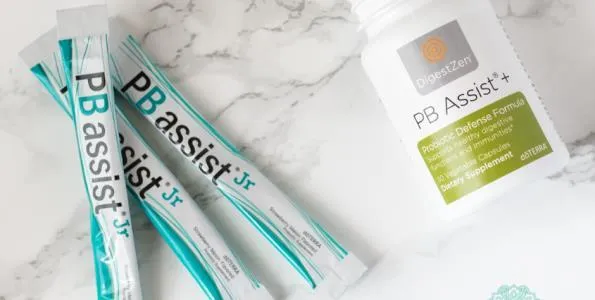Blog

Probiotics For Autoimmune And Inflammatory Disorders
Probiotics For Autoimmune And Inflammatory Disorders
Why Probiotics Are A MUST For Autoimmune And Inflammatory Disorders
Every year, new scientific research proves the link between gut health and autoimmune and inflammatory disorders.
And every year, more and more people are diagnosed with autoimmune and inflammatory disorders.
Is it due to the declining quality of nutrition in the food we get at the grocery store?
Or the increase in toxins we can’t avoid in modern society?
Whatever the root cause, the symptoms are manageable. Which is a huge relief when you or someone in your family is living with immunity issues and/or inflammation that interferes with normal daily activities.
Let’s look at some of the risk factors, symptoms, and remedies so you can find a solution that works best for you and your family.
Who Is At Risk For Autoimmune & Inflammatory Disorders?
Did you know that women are more likely to get autoimmune diseases than men?
And that often these conditions rear their ugly heads during a woman’s child-bearing years?
Not to be the bearer of bad news, but recently I read an article at womenshealth.gov that said we’re at an increased risk of developing an autoimmune disorder if we’re a woman of child-bearing years or if someone else in our family has a history of lupus or multiple sclerosis.
Other things like exposure to solvents, viral and bacterial infections, and even race can all play a part in the development. While some of those other things can be out of our control, others are things we can change today to reduce the impact on our lives.
What is an Autoimmune Disorder?
Without getting too scientific about it, a couple of things are going on in your body if you have an autoimmune or inflammatory disorder.
Our immune systems are set up to fight off any threats from bacteria or other foreign invaders but in order to do that, the system needs to know which invaders are a threat and which aren’t.
T cells in your body are the clever cells that work hard to ensure that your body can tell the difference between threats and non-threats. You will develop an auto-immune disorder if your T cells aren’t able to do their job properly, for whatever reason.
When your system is unable to tell the difference, it begins to create auto-antibodies that attack healthy, normal cells. That in turn, drains your energy while at the same time ensures you can’t effectively fight off any other bacteria that enters your body.
This process of the T cells protecting the body from injury or infection is called inflammation. Inflammation is a healthy response but as you can see, it can go overboard and cause more problems than it cures.
Unfortunately, there are over 80 different types of autoimmune disorders. The following are some of the major ones that you might be familiar with and the ones that probiotics may help with.
Autoimmune Disorders List
PANS/PANDAS
Multiple Sclerosis
Lupus
Inflammatory Bowel Disease
Crohn’s disease
Psoriasis
Type 1 Diabetes
Guillain-Barr Syndrome
Hashimoto’s Thyroiditis
Vasculitis
Lyme Disease
Fibromyalgia
How do Probiotics Help With Autoimmune Disorders?
Recent studies suggest that taking probiotic supplements may prevent and/or delay the onset of multiple sclerosis, and therefore other autoimmune disorders. According to a study published in 2019 by the Journal of Neuroinflammation, probiotics are an essential tool for preventing diseases of the central nervous system.
The probiotics work to increase the number and health of T cells in the body. These are the cells that help your body to determine if a threat is dangerous or not. Probiotics also work to reduce inflammation and pain in the body, so it’s not just autoimmune disorders they help.
Probiotics and a healthy gut are absolutely essential as a guard against all autoimmune disorders.
Where do Probiotics Come From?
Probiotics are live microorganisms that promote a healthy immune system and digestive tract. They’re known as healthy bacteria and you can take them as a nutritional supplement or get them naturally from certain foods.
Our bodies are able to manage the harmful bacteria that we all have in our bodies as long as we have an equal balance of healthy bacteria as well.
Along with probiotics, you may have heard of prebiotics and synbiotics.
A prebiotic is a nondigestible carbohydrate that feeds the probiotic and bacteria in the gut.
Once the pre and probiotics are combined they create a synergistic effect which is known as synbiotics.
All Natural Probiotic Foods
One of the most valuable lessons I’ve learned as a parent of 2 children with PANDAS, an autoimmune condition that can be very life-altering, is that diet greatly affects behaviour.
(The other most valuable lesson I’ve learned is how many toxins the average home uses daily and that eliminating those toxins also greatly affects behaviour in our kids. I’ve already dedicated quite a few posts to that topic on this blog if you’re interested.)
There are many foods that are a natural source of probiotics, including:
Yoghurt - not all yoghurt is created equal though. For probiotics you need yoghurt with live or active cultures.
Cheese - but only some types have probiotics. These include cheddar, cottage, mozzarella and gouda.
Tempeh - in addition to probiotics, tempeh also contains vitamin B12 and protein.
Kombucha - a popular drink made from tea and a live kombucha culture
Sauerkraut - contains more lact
Kefir - kefir grains are added to cows’ food to create this fermented probiotic milk.
Kimchi - a spicy Korean dish made mainly from cabbage.
Pickles/gherkins - cucumbers fermented in salt and water.
Buttermilk (traditional) - also known as “Grandma’s probiotic” this is essentially the leftover liquid from the process of making butter.
Obviously, natural is always going to be the best way to go so I encourage you to at least try some of the above foods.
What Should I Look for In A Probiotic Supplement?
For some, the list of above foods isn’t an option. Either from a lack of availability in your area or because of other health problems that conflict with fermented foods or dairy.
When that’s the case, nutritional supplements are a viable alternative for getting much needed probiotics into your system.
If you decide you want to take probiotic supplements instead, be sure to store them properly. Live cultures need to be kept in the right environment to maintain their “alive-ness.”
Capsule form is the best way to take supplements because they only release the bacteria after they’ve passed through the stomach. This means the bacteria will grow steadily in the intestines. And make sure that the supplement you buy is a blend of different bacteria. One type is not enough to maintain the health that you are going for.
Best Probiotic Supplement Recommendations
As always, do your research and find a supplement that works best for you, your diet, and your body. Consult with your doctor before making any big changes that affect your health.
But here are the probiotic supplements my family uses with great success:
My son and daughter use PB Assist Jr because, let’s face it, kids are fussy eaters and sometimes the added stress of me nagging them to eat sauerkraut or yoghurt impacts their PANDAS more than simply throwing a packet of this in their smoothie.
But PB Assist Jr also works for any adult who has trouble swallowing pills. So don’t let the Jr packaging scare you off!
Each packet of powder contains 5 billion live cells of a unique blend of six different probiotic strains and it’s tasty enough to just eat straight out of the packet.
For myself, I’m happy eating everything on the above list of foods when I’m home. But I take long road trips for work (and recently for fun to adopt 2 adorable rescue dogs!).
When I’m on the road, I take the adult version of PB Assist with me.
Every capsule contains pre-biotic fiber PLUS six strains of probiotic microorganisms.
The time-release, double-capsule delivery system is designed to help protect the sensitive probiotic cultures from stomach acid so you know it gets to the spot in your GI tract where it can do the most good.
Conclusion
If you find the idea of “good bacteria” confusing, you’re not alone!
Many people have trouble unlearning the fact that not all bacteria is harmful.
But it’s a lesson worth learning so you can balance your gut health and manage your symptoms to enjoy a healthy, happy, and productive life!
I hope this post has helped make it easier and filled you with hope for the future.
Want weekly inspiration and helpful tips for managing symptoms and living life to the fullest with learning difficulties such as PANS/PANDAS, Dyspraxia, ASD, ADHD, and more?
Check out my Facebook Page for recipes, all natural solutions, alternatives to common household chemicals, and more:
Jo Dissanayake - A Gut Instinct on Facebook
Please let me know if you have any questions about probiotics, how they work with autoimmune disorders, or raising children with PANDAS/PANS and other learning disorders.
Links to the articles I referred to in this post where you can learn more:
https://www.womenshealth.gov/a-z-topics/autoimmune-diseases
https://jneuroinflammation.biomedcentral.com/articles/10.1186/s12974-019-1611-4
https://www.healthline.com/nutrition/11-super-healthy-probiotic-foods
GET YOUR FREE
BEDTIME BLISS EBOOK:
© A GUT INSTINCT | ALL RIGHTS RESERVED | TERMS & CONDITIONS | PRIVACY POLICY

